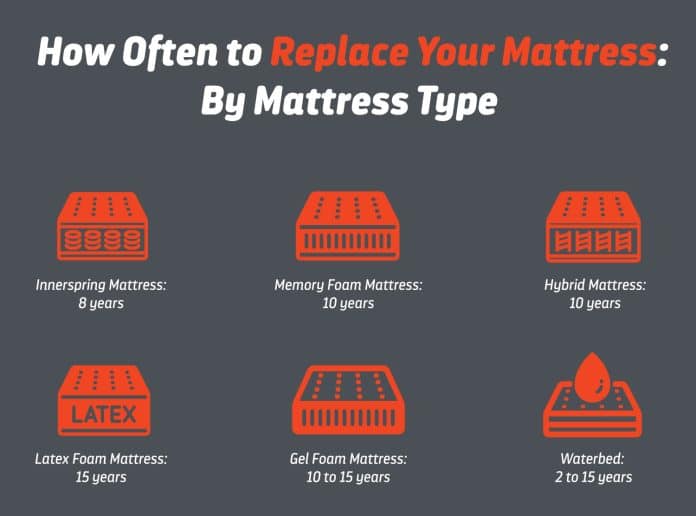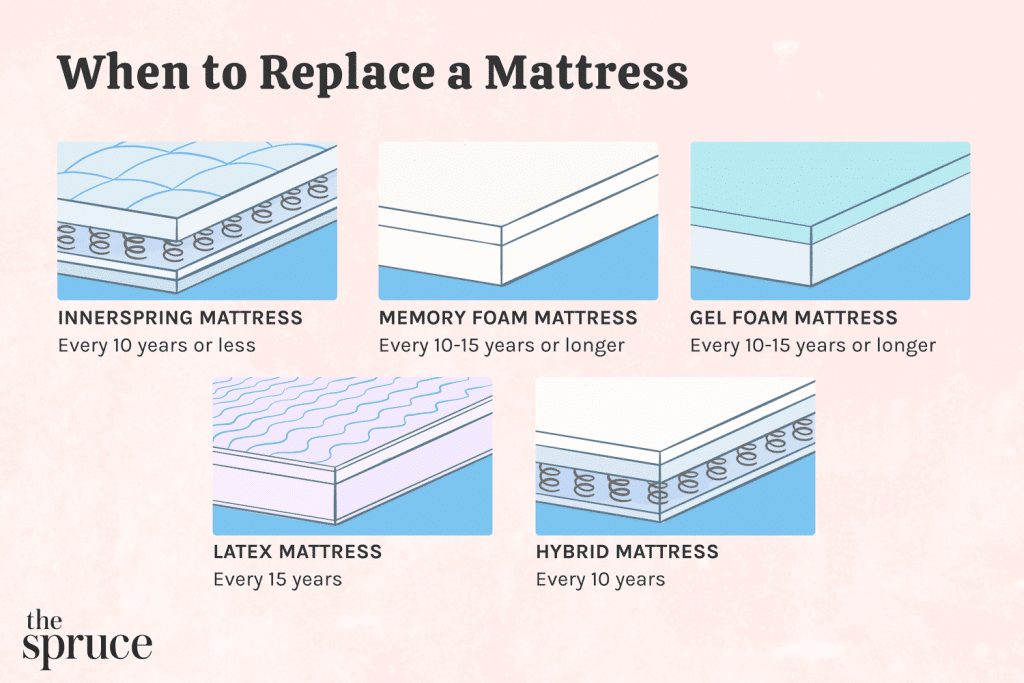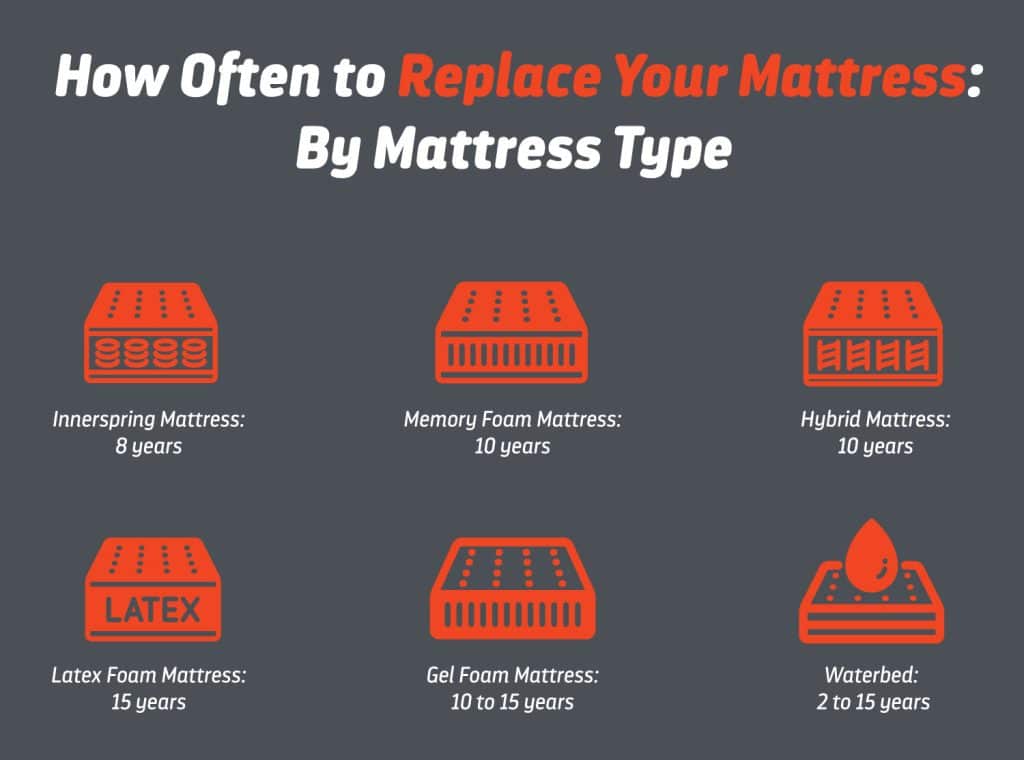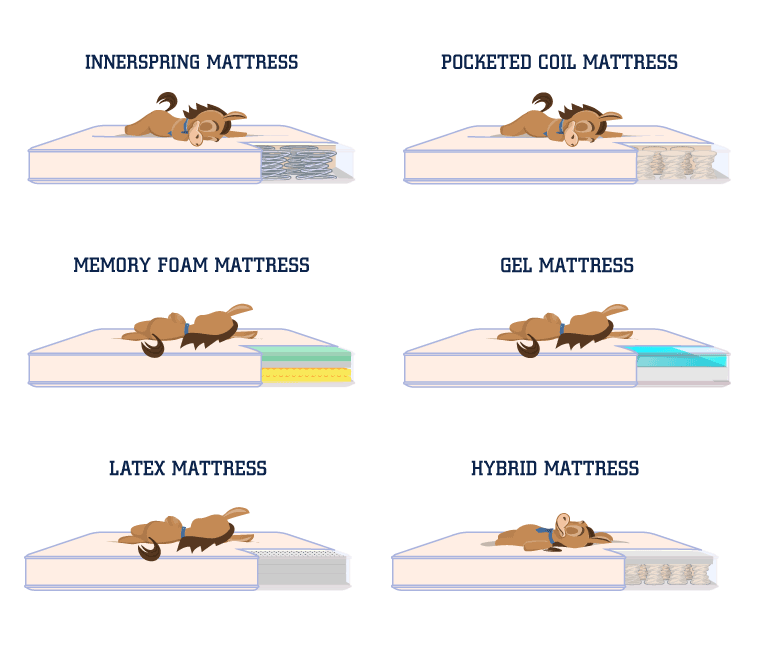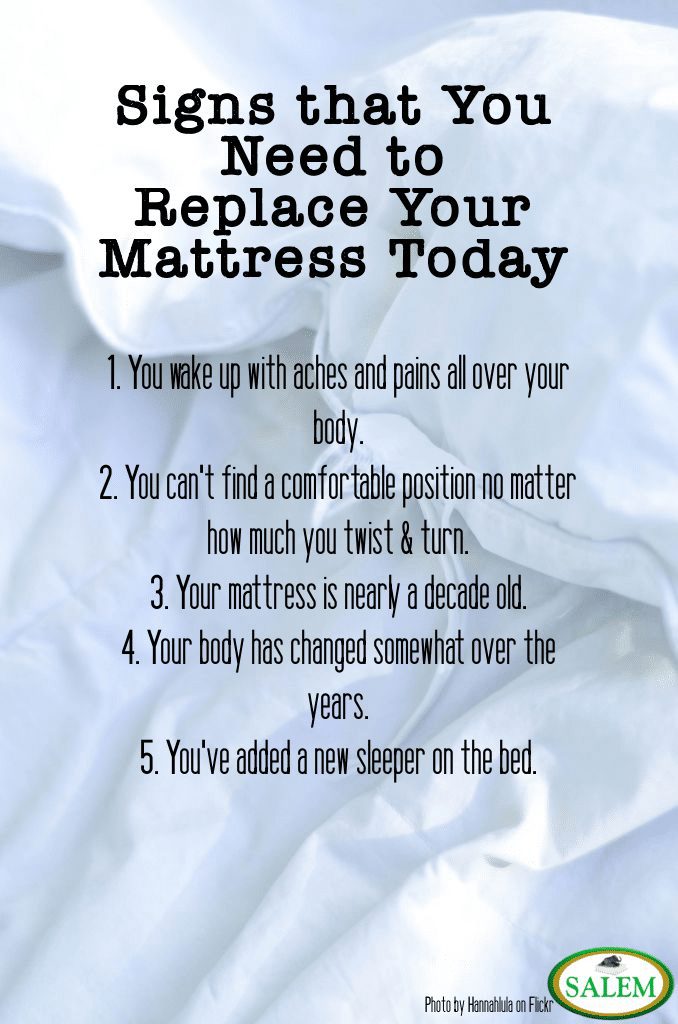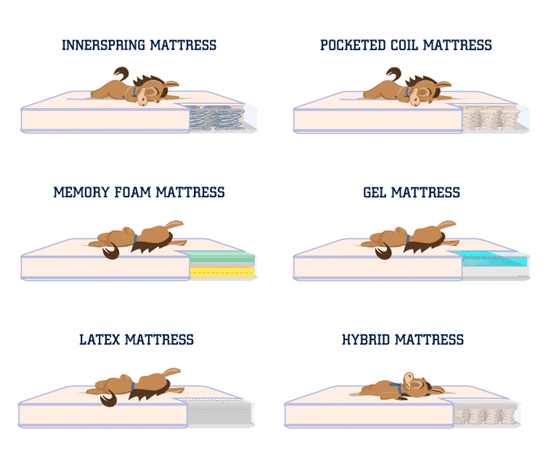Curious about when it’s time to part ways with your trusty mattress? We’ve got the scoop! In this article, we’ll be exploring the topic of mattress replacement and providing you with everything you need to know. From the lifespan of different mattress types to potential signs that it’s time for an upgrade, we’ve got you covered. So sit back, relax, and let us guide you through the world of mattress longevity.
Review contents
Factors to Consider
Type of Mattress
When considering the lifespan of your mattress, it’s important to take into account the type of mattress you have. Different materials and construction methods can affect how long a mattress will last. Some common types of mattresses include innerspring, memory foam, latex, and hybrid.
Quality of Mattress
The quality of your mattress is another crucial factor to consider. A higher-quality mattress is likely to last longer than a lower-quality one. Look for mattresses that are made with durable materials and have a reputation for longevity.
Weight of Sleepers
The weight of the sleepers can also impact the lifespan of a mattress. Heavier individuals may find that their mattresses wear out more quickly, as the added weight puts more pressure on the materials. If you or your partner are on the heavier side, you may need to replace your mattress more frequently.
Sleeping Position
Your sleeping position can affect how much wear and tear your mattress experiences. Side sleepers, for example, tend to put more pressure on certain areas of their mattresses, such as the hips and shoulders. This increased pressure can lead to quicker wear and tear, so side sleepers may need to replace their mattresses more frequently.
Frequency of Use
The frequency with which you use your mattress is another important factor to consider. If you use your mattress every night, it will likely wear out more quickly than if you only use it occasionally. Additionally, if you frequently have guests or children who use your mattress, it may experience more wear and tear.
Signs That It’s Time to Replace Your Mattress
Visible Wear and Tear
One of the most obvious signs that it’s time to replace your mattress is visible wear and tear. This can include sagging, lumps, or indentations in the mattress surface. If you notice these signs, it’s a good indication that the mattress is no longer providing the necessary support and comfort.
Sagging or Indentations
Sagging or indentations in the mattress are not only unsightly, but they can also have a negative impact on your sleep quality. When a mattress sags, it means that the internal support system is no longer holding up properly. This can result in discomfort and poor spinal alignment, which can lead to aches and pains.
Allergies or Respiratory Issues
If you find that you’re experiencing increased allergies or respiratory issues when you sleep, it may be time to replace your mattress. Over time, mattresses can accumulate dust mites, allergens, and other irritants that can trigger these symptoms. A new mattress can provide a cleaner and healthier sleep environment.
Uncomfortable Sleep
Perhaps the most obvious sign that it’s time to replace your mattress is if you consistently experience uncomfortable sleep. If you toss and turn during the night, wake up frequently, or find it difficult to find a comfortable position, it may be due to an old and worn-out mattress. Investing in a new mattress can greatly improve your sleep quality.
Waking up Tired or Sore
If you wake up feeling tired, groggy, or sore, it may be a sign that your mattress is no longer providing the support your body needs. An old mattress that lacks proper support can lead to poor sleep quality and increased discomfort. A new mattress with the right level of support can help alleviate these issues and leave you feeling refreshed in the morning.
This image is property of www.thespruce.com.
Average Lifespan of Different Mattress Types
Innerspring Mattress
Innerspring mattresses are known for their durability and longevity. On average, a high-quality innerspring mattress can last anywhere between 8 to 10 years. However, it’s important to note that the lifespan of an innerspring mattress can vary depending on factors such as the quality of materials and the weight of sleepers.
Memory Foam Mattress
Memory foam mattresses have become increasingly popular due to their ability to conform to the body and relieve pressure points. On average, a memory foam mattress can last between 7 to 10 years. It’s important to keep in mind that the quality of the memory foam and how well it’s maintained can impact the lifespan of the mattress.
Latex Mattress
Latex mattresses are known for their durability and resilience. A high-quality latex mattress can last anywhere between 10 to 12 years or more. The natural properties of latex, such as its ability to resist sagging and indentation, contribute to its long lifespan.
Hybrid Mattress
Hybrid mattresses combine the benefits of different mattress types, typically combining an innerspring system with memory foam or latex layers. The lifespan of a hybrid mattress can vary depending on the specific materials used. On average, a well-constructed hybrid mattress can last between 8 to 10 years.
Taking Care of Your Mattress
Using a Mattress Protector
Using a mattress protector is an easy and effective way to extend the lifespan of your mattress. A mattress protector acts as a barrier, protecting your mattress from spills, stains, and dust mites. It can also help prevent moisture buildup, which can lead to mold and mildew growth. Regularly washing and replacing your mattress protector can further enhance its protective qualities.
Flipping or Rotating Your Mattress
Flipping or rotating your mattress at regular intervals can help promote even wear and prolong its lifespan. This is especially important for mattresses with one-sided designs, such as pillow-top mattresses. By flipping or rotating your mattress every few months, you can distribute the weight more evenly and prevent excessive wear in certain areas.
Keeping it Clean
Regularly cleaning your mattress can help prevent the buildup of allergens, dust mites, and stains. Vacuuming your mattress every few months can remove dust and debris from the surface. If your mattress has removable covers, washing them according to the manufacturer’s instructions can help maintain cleanliness and freshness.
Avoiding Excessive Weight or Activity
To ensure the longevity of your mattress, it’s important to avoid placing excessive weight on it. This includes jumping on the bed, sitting on the edges, or using it as a trampoline. Additionally, be mindful of moving heavy furniture across the mattress, as this can cause damage to the internal structure.
This image is property of laylasleep.com.
Benefits of Replacing Your Mattress
Improved Sleep Quality
One of the primary benefits of replacing your mattress is improved sleep quality. As a mattress ages, it loses its ability to provide adequate support and comfort. By investing in a new mattress, you can ensure that you’re getting the right level of support for your body, leading to better sleep and increased overall well-being.
Reduced Pain and Discomfort
An old and worn-out mattress can contribute to aches, pains, and discomfort. By replacing your mattress, you can alleviate these issues and wake up feeling refreshed and pain-free. A new mattress with proper support can help relieve pressure points and promote proper spinal alignment.
Decreased Allergies and Respiratory Issues
Over time, mattresses can accumulate allergens, dust mites, and other irritants that can trigger allergies and respiratory issues. Investing in a new mattress can provide a cleaner and healthier sleep environment, reducing the risk of these symptoms.
Enhanced Longevity of New Mattress
By replacing your mattress at the appropriate time, you can help ensure the longevity of your new mattress. Regularly replacing your mattress when it shows signs of wear and tear can prevent excessive damage and extend the lifespan of future mattresses.
Cost Considerations
Budget Constraints
When deciding when to replace your mattress, budget constraints play a significant role. Mattresses can vary greatly in price, and it’s essential to set a realistic budget. While it may be tempting to go for the cheapest option, investing in a higher-quality mattress can provide better comfort and longevity in the long run.
Value for Money
When considering the cost of replacing your mattress, it’s important to evaluate the value for money. While a more expensive mattress may require a higher upfront cost, it may also provide better quality, durability, and comfort. Consider factors such as the materials used, warranty, and customer reviews when assessing the value for money.
Sales and Promotions
Keep an eye out for sales and promotions when looking to replace your mattress. Many retailers offer discounts or special offers during specific times of the year, such as holidays or mattress sale events. Taking advantage of these opportunities can help you get a better deal on a new mattress.
This image is property of www.i1.creditdonkey.com.
Environmental Impact
Sustainable Mattress Options
If you’re concerned about the environmental impact of replacing your mattress, there are sustainable options to consider. Look for mattresses made from organic or natural materials, such as organic cotton, wool, or natural latex. These materials are renewable and biodegradable, making them more environmentally friendly than synthetic alternatives.
Recycling and Disposal
When replacing your mattress, it’s important to consider the proper disposal of your old mattress. Many communities have mattress recycling programs that can help ensure that your mattress is disposed of responsibly. Recycling your old mattress reduces waste and helps protect the environment.
Popular Myths About Mattress Replacement
A Good Mattress Lasts a Lifetime
Contrary to popular belief, even the highest-quality mattresses have a limited lifespan. While a good mattress can provide many years of comfortable sleep, it will eventually wear out and need to be replaced. It’s essential to monitor the signs of wear and tear and replace your mattress when necessary.
The More Expensive, the Longer It Lasts
Price does not always equate to longevity when it comes to mattresses. While more expensive mattresses may offer better quality and durability, factors such as mattress type, materials used, and maintenance also play a significant role in determining lifespan. It’s important to consider all these factors when assessing the lifespan of a mattress, regardless of its price.
A Mattress Is Automatically Good for 10 Years
While it’s commonly recommended to replace your mattress every 7 to 10 years, this is not a universal rule. The lifespan of a mattress can vary depending on many factors, such as type, quality, and usage. It’s essential to evaluate the condition of your mattress regularly and replace it when signs of wear and tear are evident.
This image is property of salemph.files.wordpress.com.
Professional Opinions on Mattress Replacement
Mattress Manufacturers
Mattress manufacturers generally recommend replacing your mattress every 7 to 10 years. However, it’s important to note that this recommendation can vary depending on the specific mattress and manufacturer. Consult the warranty and manufacturer’s guidelines for more accurate information regarding the lifespan of your mattress.
Sleep Experts
Sleep experts generally agree that replacing your mattress every 7 to 10 years is a good guideline to follow. However, they also emphasize the importance of evaluating the condition of your mattress regularly and considering factors such as comfort, support, and sleep quality.
Medical Professionals
Medical professionals often highlight the role of a supportive and comfortable mattress in promoting healthy sleep. While they may not provide specific guidelines on when to replace your mattress, they emphasize the importance of replacing a worn-out mattress to prevent discomfort, pain, and sleep disturbances.
Conclusion
Replacing your mattress is an important decision that can significantly impact your sleep quality and overall well-being. Factors such as mattress type, quality, weight of sleepers, sleeping position, and frequency of use should be considered when determining when to replace your mattress. Signs such as visible wear and tear, sagging, allergies, uncomfortable sleep, and waking up tired or sore indicate that it’s time for a new mattress.
The average lifespan of different mattress types can range from 7 to 12 years, depending on the materials and construction. However, taking proper care of your mattress through the use of protectors, flipping or rotating, keeping it clean, and avoiding excessive weight or activity can help prolong its lifespan.
Replacing your mattress offers numerous benefits, including improved sleep quality, reduced pain and discomfort, and decreased allergies and respiratory issues. It’s important to consider cost considerations, such as budget constraints, value for money, and sales promotions, when shopping for a new mattress. Additionally, being mindful of the environmental impact and opting for sustainable mattress options or recycling and disposal programs can help minimize waste.
In conclusion, it’s recommended to follow the general guideline of replacing your mattress every 7 to 10 years. However, it’s essential to monitor the condition of your mattress regularly and replace it when signs of wear and tear are evident. Consulting mattress manufacturers, sleep experts, and medical professionals can provide valuable insights into the lifespan of your mattress. Ultimately, investing in a new mattress when needed can greatly improve your sleep and overall quality of life.
This image is property of www.i1.creditdonkey.com.

